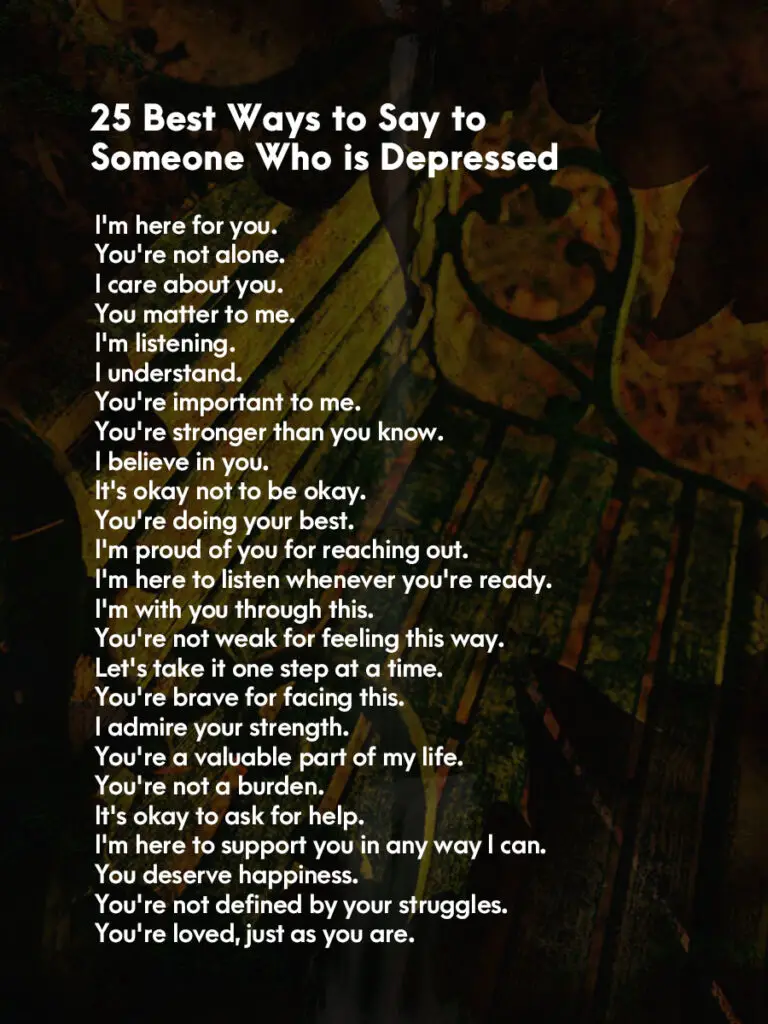If you know someone feeling down, it’s important to offer support. First off, let’s understand that depression is tough, but small gestures can make a big difference. So, what can you say? Well, start by letting them know you’re there for them. Saying “I’m here for you” or “I care about you” can mean a lot.
Also, remind them they’re not alone. Phrases like “I understand” or “I’m listening” show empathy. And don’t forget to offer practical help too, like “Let me know if you need anything.”
In this blog post, I want to talk about simple ways to support someone who’s feeling depressed. When someone we care about is struggling, it’s natural to want to help. But knowing what to say can be tough.
That’s why I’m here to share some easy-to-use phrases that can make a big difference. Whether it’s a friend, family member, or colleague, showing kindness and empathy can go a long way in helping them feel supported.

25 Great Ways to Say to Someone Who Is Depressed
- I’m here for you.
- You’re not alone.
- I care about you.
- You matter to me.
- I’m listening.
- I understand.
- You’re important to me.
- You’re stronger than you know.
- I believe in you.
- It’s okay not to be okay.
- You’re doing your best.
- I’m proud of you for reaching out.
- I’m here to listen whenever you’re ready.
- I’m with you through this.
- You’re not weak for feeling this way.
- Let’s take it one step at a time.
- You’re brave for facing this.
- I admire your strength.
- You’re a valuable part of my life.
- You’re not a burden.
- It’s okay to ask for help.
- I’m here to support you in any way I can.
- You deserve happiness.
- You’re not defined by your struggles.
- You’re loved, just as you are.
The Power Of Words
In times of depression, the words we choose to use hold immense power. Our words can make a significant impact on someone going through a difficult time, shaping their thoughts and emotions. It is crucial to understand the weight our words carry and use them wisely to support and uplift those battling with depression.
Empathy And Understanding
Empathy is the key to connecting with someone experiencing depression. Being able to put yourself in their shoes and truly understand their feelings can make a world of difference. Expressing empathy through words can create a safe space for open communication and validation of their emotions.
Avoiding Harmful Phrases
Avoid phrases that undermine or dismiss their feelings. Instead of saying “You’ll get over it”, try offering words of encouragement like “I’m here for you, we’ll get through this together.” Simple changes in our language can promote a sense of support and comfort.
| Harmful Phrases | Supportive Alternatives |
|---|---|
| “Just snap out of it.” | “I understand this is tough for you, but you’re not alone.” |
| “Everyone feels this way sometimes.” | “I hear you, and your feelings are valid.” |
| “It’s all in your head.” | “Your struggles are real, and I’m here to listen.” |
Choosing our words carefully can help create a positive impact on someone struggling with depression. By offering empathy and avoiding harmful phrases, we can provide genuine support and understanding to those who need it most.
Also Read: 40 Best Ways to Say You Agree With Someone
Offering Support
When someone we care about is dealing with depression, it’s crucial to offer the right kind of support. Here are some compassionate ways to help someone who is struggling:
Listening Without Judgment
Being a good listener without judging is essential. When you let them express themselves without any fear of criticism, it can be a huge relief for them. Just being there for them, giving them your undivided attention, and offering a safe space to talk can make a significant difference.
Encouraging Professional Help
Encouraging the individual to seek professional help is crucial. Empower them by sharing information on therapy, counseling services, or mental health resources. Remind them that seeking professional help is not a sign of weakness, but a courageous step towards healing.
Creating A Safe Environment
Being Patient
When someone is depressed, it is crucial to be patient with them. Understand that their journey to recovery may not be quick or linear. Sometimes, they may have good days, and other times, they might struggle more. Be patient and supportive, knowing that healing takes time.
Showing Love And Care
Depression can make someone feel isolated and alone. One of the most important things you can do is to show them love and care. Let them know that you are there for them, and that you care about their well-being. Small gestures can make a big difference, such as giving them a hug, sending them an encouraging text, or cooking them a meal.
Creating A Safe And Supportive Atmosphere
In order to create a safe environment for someone who is depressed, it is essential to:
- Avoid Judgment: Instead of judging or criticizing them, try to be empathetic and understanding. Remember that depression is an illness, and not a choice.
- Listen Actively: Give them your full attention when they open up to you. Don’t interrupt or offer unsolicited advice. Just be there to listen and validate their feelings.
- Respect Boundaries: While it is important to be supportive, make sure to respect their boundaries. Some individuals may not be ready to talk about their feelings, and that’s okay. Respect their privacy and let them know that you are available whenever they are ready to share.
- Encourage Professional Help: Encourage the person to seek professional help if they haven’t already. Assure them that there is no shame in seeking therapy or medication for their depression. Offer to help them find resources or accompany them to appointments if needed.
- Provide Distractions: Engage them in activities that they enjoy to distract them from their negative thoughts. Watch a movie together, play a board game, or go for a walk in nature. Being present and engaged with them can help uplift their spirit.
Ultimately, creating a safe environment for someone who is depressed is about offering them unconditional love, understanding their struggles, and supporting their journey towards recovery.
Practical Actions
When it comes to supporting someone who is experiencing depression, practical actions can make a significant difference in their well-being and overall outlook on life. These actions show your love, care, and genuine concern. By engaging in activities together and checking in regularly, you can provide a supportive presence that promotes healing and recovery.
Engaging In Activities Together
One effective way to support someone who is depressed is by engaging in activities together. Encourage them to participate in activities they enjoy, such as going for a walk in the park, cooking a meal together, or watching a movie. These shared experiences can help to distract them from negative thoughts and provide a sense of connection and belonging.
Furthermore, engaging in activities can also help to boost mood and increase energy levels. Exercise, for example, has been shown to release endorphins—an important mood-lifting chemical in the brain. By joining them in these activities, you can provide motivation, companionship, and create an environment that promotes their overall well-being.
If you’re unsure about what activities they might enjoy, ask them directly. Encourage open and honest communication, and be willing to try new things together. Remember, the key is to provide support and actively participate, rather than pushing them to engage in activities they’re not comfortable with.
Checking-in Regularly
Regular check-ins are vital to ensure individuals struggling with depression feel seen, heard, and supported. By staying connected, you can offer them a listening ear and create a safe space for them to express their emotions. Checking-in doesn’t have to be a formal or complicated process; a simple text message, phone call, or even dropping by for a visit can make a big difference in their day.
During these check-ins, actively listen without judgment or interruption. Provide empathy and validate their feelings, letting them know they are not alone in their struggles. Offer assistance in any way you can, whether it be helping with household chores, running errands, or accompanying them to therapy sessions.
Additionally, making plans for regular get-togethers can give them something to look forward to and a sense of structure in their lives. This can provide a much-needed routine and reduce feelings of isolation that often accompany depression.
Encouraging Positivity
Affirming Their Strengths
One way to support someone who is facing depression is to acknowledge their strengths. Let them know that they possess unique qualities that are valued and appreciated. By affirming their strengths, you can help them gain a more positive perspective on their abilities and boost their self-esteem.
Highlighting Progress
Recognizing the progress the individual has made can be a powerful source of encouragement. Whether it’s simply getting out of bed, reaching out for help, or engaging in a healthy activity, emphasizing their progress reinforces their sense of accomplishment and motivates them to continue striving for improvement.

More Additional Response
- You’re not alone in this journey.
- I’m here to walk beside you.
- Your feelings are valid.
- You’re worthy of love and happiness.
- I’m grateful to have you in my life.
- You’re not weak for seeking help.
- I’m here to support you, no matter what.
- You’re stronger than you realize.
- It’s okay to take things one day at a time.
- You’re not defined by your struggles.
- I believe in your ability to overcome this.
- You’re capable of healing.
- I appreciate your honesty and openness.
- You’re making progress, even if it doesn’t feel like it.
- I’m here to remind you of your worth.
- You’re not alone in facing challenges.
- I’m sending you positive thoughts and energy.
- You’re deserving of kindness and compassion.
- I’m here to lend a listening ear whenever you need it.
- You’re important to me, and I’m here to support you unconditionally.
Related:
Conclusion
Show compassion and offer support to those with depression. Small gestures can make a big difference. Utilize active listening and be patient. Encourage seeking professional help if needed. Remember, your kindness could be the spark that brings hope to someone in their dark times.









